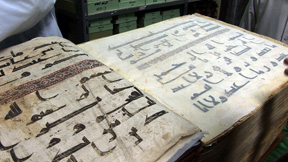The Koran: The Origins of the Book
A Film by Bruno Ulmer, 2009
Icarus Films
“The Koran: The Origins of the Book” challenges the prevalent Muslim belief that the Koran has remained unchanged since it was revealed to the Prophet Mohammad between 610-632 AD. Director Bruno Ulmer commences by recounting a standard version of Islamic history, interspersing sounds of Koranic recitations, shots of the faithful praying, and artistic images that instill in us a powerful respect for Muslim tradition. He discusses how the Muslim belief that there has been no change in the Quran since its inception was challenged in 1972, when the caving in of Yemen’s Great Mosque revealed a hideaway cache of some Koranic manuscripts dating back to the 7th century. In the eyes of European scientists, these Koranic manuscripts — with their different arrangements of suras and assortments of foreign and non-Arabic words — were invaluable for acquiring knowledge about the Holy Book of Islam. Like the Holy texts of Judaism and Christianity, it was clear that the Koran also had a history that demanded researching.
With a keen sense of the visual, Ulmer goes on to describe the birth of Islam, its early history, the subsequent death of the Prophet Muhammad, and finally the historical schism between Sunnis and Shiites. Both Umayyad Caliph Uthman’s struggle to unite the Islamic community by permitting only one version of the Koran, and Umayyad Caliph Abdel Malek’s later success in improving upon his predecessor’s rendition are examined. Ulmer explains how it came to be that by a mere century after the death of the prophet, Uthman’s was the sole accepted Koranic text. Perhaps in contrast, numerous versions of the Koran, with their many colors, motifs, and decorative bands are featured. The film also contains footage of Muslims studying and interpreting Koranic verse alongside western scientists. Since the different versions can spur multiple (and sometimes inconsistent) readings, many believers have chosen to be a part of a process of determining where Muslim tradition and scientific research merge, so as to prevent faulty or prejudicial interpretation.
Bruno Ulmer treats a highly controversial topic with sensitivity, striving for understanding, as opposed to judgment. By zeroing in on the actual compiling of the Koran, with heavy attention given to artistic image, the documentary makes a noteworthy contribution to the study of Islamic history. Both the beginner and more advanced scholar of Islamic history can appreciate the spirit and substance of this film.
This article appeared in Al Jadid Magazine, Vol. 16, No. 62, 2010.
Copyright © 2010 by AL JADID MAGAZINE

